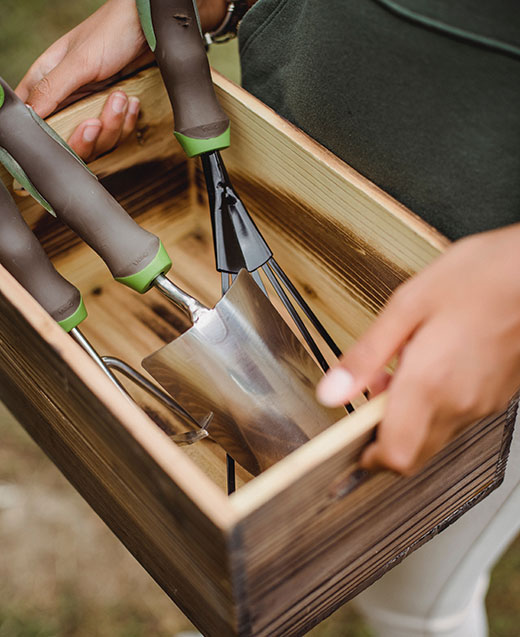
Container gardens require less space and simpler tools.
Container gardens, raised beds offer convenient options to gardeners
K-State horticulturist shares tips for success in smaller spaces
March 28, 2022
By Pat Melgares, K-State Research and Extension news service
MANHATTAN, Kan. – Gardeners take notice: Dennis Patton has a suggested alternative to growing flowers and vegetables in Kansas soils high in clay content.
Make your own.
That is, you can build your own ‘mini-garden’ in either a container or – on a slightly bigger scale – in raised beds.
“Container gardening basically means you’re growing your crops – whether it be vegetables or flowers – in some sort of container,” said Patton, a horticultural agent with K-State Research and Extension’s office in Johnson County.
“Containers can make gardening easier because you’re maintaining a small space. You can use a good, quality potting soil that makes it easier to maintain. And they can go just about anywhere, from full sun to full shade.”
Listen to an interview by Jeff Wichman with Dennis Patton on the weekly radio program, Sound Living
Patton said some prefer container gardening because – in the right spot – it eliminates the need to stoop over or bend to work the ground. And often, the tool of choice is a trowel, rather than a shovel.
“The only difference between container gardening and a traditional in-ground garden is that you’re doing it in a more confined space where you have more control,” Patton said. “The biggest concern or challenge with container gardening is the watering. I always tell people if you want a lower maintenance container garden, always go with a larger size container, because the smaller the container, the more rapidly it dries out.”
He suggests a five gallon container, “because it gives you enough mass of soil that you can grow a lot of plants and you’re not going to be a slave to watering.”
Some good spring choices for container gardening include lettuce, spinach, radishes and onions. Then follow up with tomatoes and peppers by mid-May.
“A real common vegetable thing to do this time of year is to put radishes, lettuce, spinach into a container – those early spring crops – and then save room in the center of the pot to pop in your tomato or pepper plant come mid-May,” Patton said. “By that time, a lot of the spring crops are on the way out.”
Watering and fertilizing container-grown crops is important, according to Patton.
“Where people fail in containers is they don’t water enough and they maybe don’t fertilize enough,” he said. “Because we’re putting so much water through that container that, it does take a steady feed.”
Raised bed gardening
Another popular trend in recent years is raised bed gardening, which looks like a large container on the ground.
“The classic raised bed is 4 feet wide by 8 feet long,” Patton said. “It can be any size, but we usually try to go 4 feet wide so we can maintain our garden without stepping on the soil.”
Raised beds are typically filled with an amended soil mix made of approximately 50% topsoil and 50% organic matter, such as compost.
“It’s a great way to improve our typical Kansas soils that are heavy in clay and tend to be really wet and hold water when it rains, or hard as a rock when they’re dry,” Patton said.
Patton said raised beds are conducive to intensive planting, or planting crops on “every square inch…which means we’re going to have less problems with weeds.”
Container gardening, he added, “really is no different than gardening in-ground. It is just another way to work around our soils and concentrate our plantings. People with limited space can get a lot of production out of a small space.”
For more information on gardening in Kansas, Patton suggests his “go-to resource,” the Kansas Garden Guide, which is available online from the K-State Research and Extension bookstore.
Information on gardening also is available at local extension offices in Kansas.

